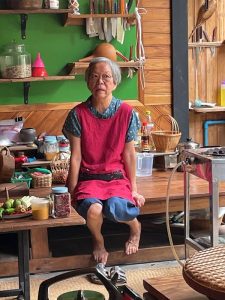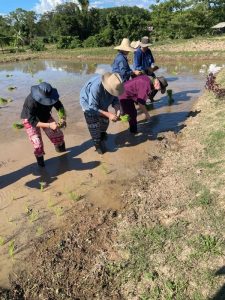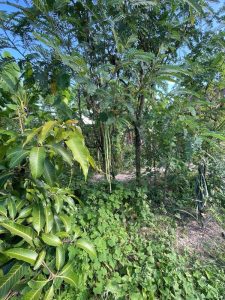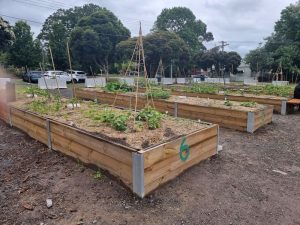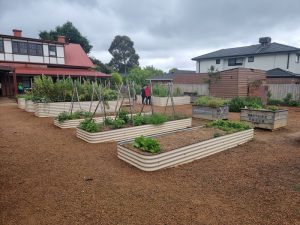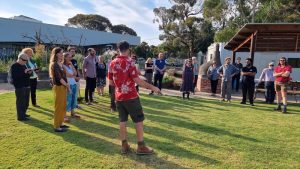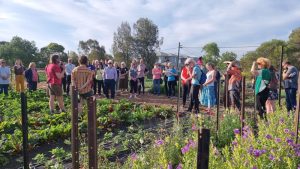Thanks to the people who have contributed to this week’s newsletter: Anna Sanders, Jennie Ramage, Julie French and Robin Gale-Baker.
‘Hilling up’ all root vegetables (by Robin Gale-Baker)
‘Hilling’ or ‘hilling up’ of potatoes is a well-known technique for producing more tubers and preventing ‘greening’ (which is toxic to potatoes). Less well-known is that hilling up all root vegetables will lead to better produce. It will also prevent shoulder ‘greening’ of carrots.
Have you ever noticed the top of a carrot being green, particularly in situ in the row? This is caused by the carrot top growing above the soil, receiving direct sunlight and ‘greening’. The taste will be rather bitter (but it will not be toxic as potatoes are when they are exposed to sunlight). Obviously, you can simply cut the top off and use the rest of the carrot but an even better option is hilling it up instead – and then you can eat the whole carrot.
Hilling can be done in one of two ways.
- The first way is to create a hill or mound by hoeing the soil and pulling it up into a long, raised row. Seeds or seedlings are then planted directly into the top of the mound.
- The second way is to sow root vegetables in a ‘flat’ bed (i.e. a normal in-ground bed) and, once shoots emerge, soil is scraped from both sides and hilled up to cover the shoulder of the plant. The shoots should not be covered but any protruding shoulders of the veggies should.
Hilling has a number of general advantages including:
- Providing good drainage.
- Keeping weeds at bay.
- Fluffing up soil, allowing roots to penetrate deeper and swell more easily so they take up more nutrients and water.
- Protecting tender shoots from bad weather and supporting the plant’s stability in the soil.
Root vegetables are meant to fully develop underground but you may notice that they can sometimes protrude 3-4cm above the soil. This may be the result of seed that germinated just beneath (or on) the surface of the soil, or a lack of water. Protruding tops never taste good, they lack juice and have a tendency toward woodiness.
It pays to keep an eye on all root crops and, around a month after germination, check that the shoulders of your carrots, parsnips, turnips, beetroot, etc are covered. If not, or perhaps anyway, use a trowel to break up the soil either side of the rows and drag it into a mound over the tops leaving the new shoots exposed.
Then repeat your inspection every 3 or 4 weeks and hill when necessary.
Read more of Robin’s articles about veggie growing on our web site.
A Thai food experience (by Julie French)
[Julie visited Duang Tengtrirat in Thailand in July 2023 for a 10 day cooking and cultural tour. As well as being Julie’s friend, Duang is a reader of this newsletter and used to live in North East Melbourne. Julie has written up her trip for our website, with a shortened version below.]
How often do you get an invitation to be a part of a group visiting an unspoilt part of Thailand to experience an authentic taste of its food and culture, guided by a well-connected local person, passionate about her town and region? My invitation was from a good friend, Duang, and it was too good to resist. I had heard so much about her years growing up in a village in northern Thailand, especially her stories around food and learning to cook in her mother’s kitchen. Duang’s mother had recognised her daughter’s cooking curiosity and skill from an early age and Duang had grown up helping her to cook and learnt by observing what and how she cooked. She has carried those skills and love of cooking throughout her life and wanted to share this with her wide circle of friends using her mother’s traditional Thai kitchen as the base.
Duang’s 10 day cooking and cultural experience of her home town of Nan, close to the Laotian border, alternated days of cooking and learning about traditional northern Thai food with visits to places of interest in and around Nan. One of the standouts of the visits was to a farm which was an example of permaculture in practice. On arrival at the farm, the first thing that impressed was the lush picture book garden, a mix of insect attracting flowers and food producing plants grown in swales. A pond at a lower point on the farm supplied the family with fish; recycling of waste was evident from the large active compost pile; and power was generated by a small array of solar panels. The wet season was late so the surrounding fields were still dry, apart from one that had been flooded to enable at least some rice to be planted. Foraging in the flourishing food forest was followed by dinner preparation, much chopping and slicing and cooking over a coal brazier, culminating in a fabulous feast of Thai salads, charcoal grilled vegetables and fish and delicious sticky rice. It was hard to leave.
Read Julie’s full write up of the visit.
A newsletter reader tip – tomato watering (by Jennie Ramage)
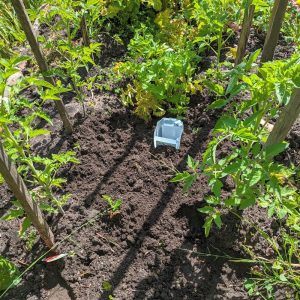 Cut the bottoms out of 2 litre plastic milk containers. Place the containers upside down in a deep hole between the tomato plants, leaving around 5cm above the soil. Pack the soil firmly around the container (not too packed, but not too loose). When mulching, bring the mulch right up to the edge of the container, as well as right up to the stems of the tomatoes. It is best to place this watering system at the same time as planting the tomatoes so that you don’t disturb the roots of the plants. When watering the plants when they are young, water with a handheld sprinkler on the roots of the small plants. As the plants grow and their roots spread, and as summer heats up, fill the 2 litre containers with a handheld hose. The water then slowly seeps out of the inverted pouring hole, encouraging the roots of the tomatoes to grow deep in search of the moisture.
Cut the bottoms out of 2 litre plastic milk containers. Place the containers upside down in a deep hole between the tomato plants, leaving around 5cm above the soil. Pack the soil firmly around the container (not too packed, but not too loose). When mulching, bring the mulch right up to the edge of the container, as well as right up to the stems of the tomatoes. It is best to place this watering system at the same time as planting the tomatoes so that you don’t disturb the roots of the plants. When watering the plants when they are young, water with a handheld sprinkler on the roots of the small plants. As the plants grow and their roots spread, and as summer heats up, fill the 2 litre containers with a handheld hose. The water then slowly seeps out of the inverted pouring hole, encouraging the roots of the tomatoes to grow deep in search of the moisture.
Growing avocados in a temperate climate
Read the article by Duncan Cocking (aka Lead, Root & Fruit), who lives in Kyneton. As with all of Duncan’s articles, the material is comprehensive.
As I can attest from personal experience, it is perfectly possible to grow avocados in Melbourne. As Duncan discusses, one important point to note is that the trees suffer from the heat of the Summer even more than from the cold of the Winter. So, young trees need protection (e.g. shade cloth) from both the cold and the harsh sun.
The Craftwork Roasting Company
Around a month ago, I mentioned that I had stumbled across a new cafe in Eltham called the Craftwork Roasting Company. Well, as well as being a cafe, they are also a coffee roaster and it is in this context that they now have a page in our Local Food and Drink Directory.
They roast coffee, which they then sell in bags online and at their shop (1/27 Peel Street, Eltham). There are 9 choices across espresso and filter at any one time, including 6 single origins, sourced through select merchants who work ethically and sustainably with coffee producers.
Their cafe (aka brew bar) and retail space has windows looking into the roasting and production area. Customers can browse brewing equipment, ceramic cups and Craftwork beans while they wait for their takeaway coffee. Or they can sit down to drink their coffee together with house baked pastries, cakes and bread.
Welcome Caleb and Rebecca!
Some new(ish) community gardens
Last Sunday, many of our local community gardens had open days. I (Guy) chose to go to two that I wasn’t familiar with, namely Mooroolbark (left hand photo) and Strathdon House in Forest Hill (right hand photo). I will provide more information about these two community gardens in the new year.
Some established food growing areas in Banyule
As part of the launch of their new food strategy last week, Banyule Council showed a number of us round Bellfield Community Garden (left hand photo) and the nearby Farm Raiser farm (right hand photo). In the photos, Paul, Eve and Patrick (all newsletter readers) are talking about what happens at these two places.
More on the Victoria Container Deposit Scheme (by Anna Sanders)
“Thanks for letting us know that the Victoria Container Deposit Scheme is now live. I pick up litter on my daily walk in Eltham and recently collected 3 cans that had the 10c deposit on them, so I took them to the milk bar to test the process, which worked. However, I’m not sure how many people are aware of the refund process yet because, on my walk home from the milk bar, I picked up another $1 worth of recyclables! Wouldn’t it be great if Coles and Woolworths made a big deal of the scheme and became one of the refund points? Let’s all get involved!”
Panton Hill Winery is up for sale
 See the realestate.com.au website. This is obviously a major development in terms of Nillumbik wineries. But less obviously, it is also a major development in terms of Nillumbik real estate because the buildings are perhaps the most striking/beautiful suite of buildings in the whole of Nillumbik.
See the realestate.com.au website. This is obviously a major development in terms of Nillumbik wineries. But less obviously, it is also a major development in terms of Nillumbik real estate because the buildings are perhaps the most striking/beautiful suite of buildings in the whole of Nillumbik.
‘Crowd harvest’ – seeds for Christmas
Gardeners with excess seeds are invited to send them in a Christmas card or holiday card to one of the not-for profit organisations listed below who will, in turn, either germinate the seeds, store them or distribute them to people facing crisis yet know how to start seeds. Please package the seeds in individual and labelled packages so that food relief recipients can easily take them home. The program runs from 1st December to 15th December.
DIVRS in Preston; Liberty Church (c/o Ps Bob Taranto) in Epping; Odyssey House Victoria at 28 Bonds Road, Lower Plenty, 3093; or STREAT in Collingwood. Alternatively, Tiny Trowel, PO Box 4076, Box Hill South, 3128.
Mitcham Community Meal
 Mitcham Community Meal provides a free community dinner every Sunday evening, where each meal is cooked by a different local community group. During November, the cooking teams were Melbourne Chinese Church of Christ, Mitcham Baptist Church, Rotary Nunawading and Team Francis (see photo right). Look at some photos of these teams, plus those of previous teams.
Mitcham Community Meal provides a free community dinner every Sunday evening, where each meal is cooked by a different local community group. During November, the cooking teams were Melbourne Chinese Church of Christ, Mitcham Baptist Church, Rotary Nunawading and Team Francis (see photo right). Look at some photos of these teams, plus those of previous teams.
Another video from Simone Boyd
Why you should plant tomato seedlings deep.
Our articles over the last month
Here are some of the articles from our newsletters over the last month that you might have missed:
- The garden at Murundaka Co-housing Community (by Ann Stanley).
- Self-seeding edible annuals (by Jaimie Sweetman).
- Old man’s saltbush (Atriplex nummularia).
- The Railway Garden in Princes Hill.
What seeds to plant in December
Here is a list (see the planting guide for more detail):
Warm season veggiesBeans |
Leafy greensLettuce |
RootsBeetroot |
PerennialAsparagus |
December is not a very good planting month: arguably too late for many summer veggies and, although you can plant leafy greens such as lettuce and mustard greens, they are likely to go to seed pretty quickly.
The Melbourne ‘Local Food Connections’ community radio show
There won’t be an episode on Sunday (3rd December).
Which link was clicked most times in the last newsletter?
The most popular link in the last newsletter was the ABC article about the garden in Collingwood being under threat.
Regular activities over the coming week
Farmers’ and other food markets
- Friday: Community Grocer, Carlton and Farm Raiser farmgate (Bellfield).
- Saturday: Carlton, Coburg and Farm Raiser farmgate (Bellfield).
- Sunday: Alphington, Eltham and Heathmont.
- Tuesday: Community Grocer, Fitzroy.
- next Wednesday: Really Really Free Market (Coburg).
Food swaps
- Saturday: Bayswater North, Brunswick East, Fitzroy, Heidelberg West, Mernda, Pascoe Vale and Glenroy, Rosanna and Warrandyte.
- Sunday: Blackburn, Montmorency and Regent (Reservoir),.
Community gardens
- Thursday: Buna (Heidelberg West), Diamond Valley Library (Greensborough), Edible Hub (Hurstbridge), SEEDs (Brunswick) and Whittlesea.
- Friday: Coburg Common (open day), Reynard Street (Coburg) and West Brunswick.
- Saturday: Coburg Common (open day), Links (Lalor), Macleod, Pentridge (Coburg) (open day) and Thrive (Diamond Creek).
- Sunday: Fawkner Food Bowls, Northcote Community, Pentridge (Coburg) and Regent (Reservoir).
- Monday: Panton Hill, SEEDs (Brunswick) and Whittlesea.
- Tuesday: Doncaster Hill and Watsonia.
- Next Wednesday: Eltham Neighbourhood House, Macleod, Newton Street (Reservoir), Span (Thornbury) and Sylvester Hive (Preston) .
Upcoming face-to-face events – not cooking
Sustain and Oakhill Farm holiday barbecue; Thursday, 21st December, 5-8pm; free; Preston.
They will be cooking up a variety of meat and non-meat options on the grill. Take your own drinks plus a side dish to share if you’d like.
In November
- Panel discussion; Wednesday, 29th November, 5.30-8pm; $27 ($11 per hour); Abbotsford.
- Urban Nanna’s festive hints and tips; Thursday, 30th November, 6-7.30pm; free; Ringwood.
In December
- Community composting conversation; Friday, 1st December, 11am-midday; free; Coburg.
- Twilight garden festival; Friday, 1st December, 3-7pm; free; Coburg.
- Intro to composting; Friday, 1st December, 4.30-5.30pm; free; Coburg.
- Introduction to beekeeping (2 sessions); Saturday, 2nd December, 9.30am-4.30pm and Saturday, 9th December, 10am-12.30pm; $225 ($24 per hour); St Helena.
- Worm farming workshop; Saturday, 2nd December, 10-11am; free; Coburg.
- Summer fruit tree pruning with Chris England; Saturday, 2nd December, 10am-1pm; $65 ($22 per hour); Burnley.
- Crop planning and rotation (2 sessions); Saturday, 2nd December, 10am-2pm and Sunday, 3rd December, 10am-3pm; $359 ($40 per hour); Bundoora.
- Plant to harvest; Saturday, 2nd December, midday-1pm; free; Macleod.
- Vegetable garden planner workshop; Saturday, 2nd December, 2.30-4pm; $47 ($24 per hour); Bundoora.
- Plants and permaculture; Sunday, 3rd December, 10am-3pm; $120 ($24 per hour); CERES.
- The Veggie Empire urban farm tour; Sunday, 3rd December, 11am-midday; $11; St Helena.
- Resin art with ink – cheese platter (2 sessions); Monday, 4th December, 7-9pm and Tuesday, 5th December, 7-8pm; $95 ($32 per hour); Mount Evelyn.
- Preparing for the summer harvest with Teresa Day; Wednesday, 6th December, 6.30-8.30pm; free; Doncaster.
- Forage walk; Saturday, 9th December, 10am-midday; $35 ($18 per hour); Coburg.
- DIY mushrooms; Saturday, 9th December, 10am-4pm; $175 ($29 per hour); CERES.
- Sustain and Oakhill Farm holiday barbecue; Thursday, 21st December, 5-8pm; free; Preston.
Regular events
- Beekeeping workshop; roughly once a month on Saturdays, 1-3.30pm; $85 ($34 per hour); Brunswick East.
- Carlton aperitvio food tour; every Friday, 5-7pm; $139 ($70 per hour); Carlton.
- Classic cocktails; various Tuesdays, 7-10pm; $70 ($23 per hour); Fitzroy.
- Edible Forest tours; every Friday and Saturday, 11am-1pm and again at 1-3pm; $25 ($13 per hour); Dixons Creek.
- Eltham trails (walking food tour); various Saturday mornings and Thursday evenings; $65 ($22 per hour); Eltham.
- Flavours of Coburg food tour; 3rd Saturday of each month, 10am-1pm; $65 ($22 per hour); Coburg.
- Gin making masterclass; most Saturdays, 10am-1pm; $175 ($58 per hour); Nunawading.
- Gin masterclass; most Saturdays and Sundays, midday-1pm; $80 ($80 per hour); Eltham.
- Wine tasting; various days, times and prices; Abbotsford.
Upcoming face-to-face events – cooking
In November
- Easy recipes on a budget with Open Table; Wednesday, 29th November, 4-5pm; free; Carlton.
In December
- Buche de noel workshop; Friday, 1st December, 6-9pm; $91 ($30 per hour); Lower Templestowe.
- Kombucha, jun, water kefir, wild mead and beet kvass; Friday, 1st December, 6.30-8.30pm; $180 ($90 per hour); Fitzroy North.
- Sourdough breadmaking; Saturday, 2nd December, 10am-12.30pm; $71 ($28 per hour); Lower Templestowe.
- Baking for Christmas; Saturday, 2nd December, 10am-2pm; free; Kilsyth.
- Authentic Mexican; Saturday, 2nd December, 10am-3pm; $120 ($24 per hour); CERES.
- Sourdough bread baking; Sunday, 3rd December, 9am-5pm; $190 ($24 per hour); CERES.
- Christmas tree cake class; Sunday, 3rd December, 1-4pm; $245 ($82 per hour); Diamond Creek.
- Gluten-free Christmas baking; Wednesday, 6th December, 10am-12.30pm; $35 ($14 per hour); Balwyn North.
- Get your dad in the kitchen!; Wednesday, 6th December, 4-6pm; free; Hawthorn.
- Hamed Allahyari – salamati; Wednesday, 6th December, 6.30-8pm; free; Fitzroy North.
- Indian cooking – Punjabi (2 sessions); Wednesdays, 6th and 13th December, both 6.30-8.30pm; $99 ($25 per hour); Hurstbridge.
- Gingerbread making with Mumma Sweden; Thursday, 7th December, 6.30-8.30pm; $70 ($35 per hour); Collingwood.
- Christmas cooking gift ideas; Friday, 8th December, 1.30-3pm; free; Greensborough.
- Gingerbread house for adults; Friday, 8th December, 6-9pm; $69 ($23 per hour); Lower Templestowe.
- St John’s Christmas gingerbread house making event; Friday, 8th December, 7.30-9.30pm; $40 ($20 per hour); Diamond Creek.
- No waste cooking demonstration with Open Table; Saturday, 9th December, 10-11am; free; Reservoir.
- Festive preserves; Saturday, 9th December, 10am-1pm; $81 ($27 per hour); Forest Hill.
- Christmas cookie creations; Saturday, 9th December, 10am-2pm; free; Kilsyth.
- Feta masterclass; Sunday, 10th December, 10am-3pm; $240 ($48 per hour); CERES.
- Gingerbread house decoration; Sunday, 10th December, 10.30am-midday; $50 ($34 per hour); Camberwell.
- Christmas cupcake class; Wednesday, 13th December, 10am-12.30pm; $145 ($58 per hour); Diamond Creek.
- Gingerbread house decorating workshop; Wednesday, 13th December, 1-3.30pm; free; Mill Park.
- Vegan chocolate making; Thursday, 14th December, 6.30-8pm; $80 ($53 per hour); Collingwood.
- Gingerbread house for children; Saturday, 16th December, 10-11.30am; $53 ($35 per hour); Lower Templestowe.
- Gingerbread cookie house workshop; Saturday, 16th December, 1-2.30pm; $65 ($44 per hour); Forest Hill.
- Gingerbread house decoration; Saturday, 16th December, 2-3.30pm; $50 ($34 per hour); Camberwell.
Regular classes
- Al dente cooking (Italian); most Saturdays, 9am-1pm; $155 ($39 per hour); Chirnside Park.
- BBQ classes; various days and times; $135-150 ($45-50 per hour); Brunswick East.
- Bread making; various Sundays, 8am-2pm; $230 ($38 per hour); Abbotsford.
- Brunswick Kitchen (many different classes); various dates, times and prices but mostly 2½ hours long and $120; Brunswick.
- Chocolate making and pastry classes for children; various days and times; various costs; Yarra Glen.
- Chocolate making workshop; various Thursdays, Fridays and Saturdays; $152 ($38 per hour); Blackburn.
- Kombucha brewing workshop; last Thursday of each month, 7-11pm; $49 ($12 per hour); Brunswick.
- La Cucina di Sandra (Italian); various evenings, 6.30-10.30pm; $120 ($30 per hour); Richmond.
- Margot & Montanez (alfajores biscuits); monthly on Sundays, 10am-1pm ; $109 ($36 per hour); Camberwell.
- Otao Kitchen (many different classes); various dates, times and prices but mostly 3 hours long and $197; Abbotsford.
- Rosa’s cooking classes (Italian); various Saturdays and Sundays, 10.15am-3pm; mostly $165 ($35 per hour); Bundoora.
- Sourdough bread workshop; roughly once a month on Saturdays, 9-11.30am; $185 ($74 per hour); Brunswick East.
- Tea blending; various Sundays; $75 ($60 per hour); Brunswick.
- The ultimate biscuit class; various Tuesdays, 10am-3pm; $162 ($32 per hour); Blackburn.

